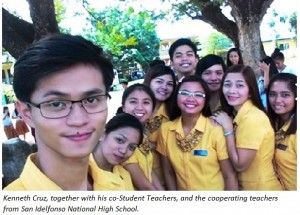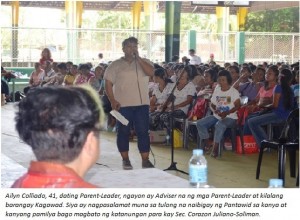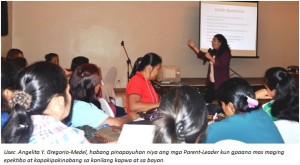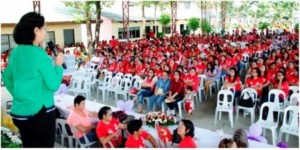My Experiences are my Greatest Teachers
Kenneth Cruz, 20, the fourth child of Mrs. Rosario Cruz, sewer, and buyer and seller, and Mr. Fernando Cruz, deceased, among their five (5) children. Their family was crippled 10 years ago when his father died, and then when Pantawid Pamilyang Pilipino Program came into their life, as if a crutch was offered to them. “Siguro po kung buhay pa ang tatay ko ay hindi rin kami masasali sa Pantawid (Maybe if my father is still here, we would not be part of Pantawid),” said Kenneth.
Two of his older brother only finished Grade Six (6), her older sister, on the other hand, was only able to reach First Year College, while he will now finish Bachelor of Secondary Education major in English this coming April 29, 2016, with a recognition of being the Best Student-Teacher among the more or less hundred graduating students of the Bachelor of Science in Secondary Education. He is now also hired as a faculty member in a private school.
“Dati po malimit na malilit na magkaulam kami, kapos din posa mga pang-araw araw na pangangailangan. Kaya po malaking tulong ang Pantawid sa buhay namin. Napakahirap pong magpaaral ng college, malimit nating marinig, pero dahil po sa SGPPA, napakalaking bagay. Maraming requirements, pero dahil po sa scholarship ay nakakapag-comply ako ng walang problema (Before we rarely had viand on our late, we also cannot maintain meeting our daily needs. That is why Pantawid is indeed a helping hand. It is hard to send someone in college, as we often times hear, but because of the SGPPA, what a great assistance. We had so many requirements, yet because of the scholarship, I can hassle-free comply with them),” narrated Kenneth.
“Iba po yung may komportableng buhay. Kaya naman pagsusumikapan kong tulungan si nanay. Sa edad po niya ngayon ay hindi na siya dapat nahihirapan (Having a comfortable life is really different. That is why I am going to do my best to help mother. She should not be having hard times at her age),” he added.
Opportunity knocks once, Kenneth believes; people should make the most out of it then, he suggested.
“Habang may tumutulong pagbutihan, dahil babalik rin naman sayo yun. Hanggang sa dumating yung pagkakataon na ikaw na man yung makakatulong sa mga nangangailangan (As long there is an aid, do persevere, for it will eventually paid off. Then a time will come that is is already you who is going to be an aid to the needy),” emphasized Kenneth
Poverty is not forever, that is what Kenneth hoped to instill in every mind of her future students. “Ikaw lang din sa huli ang kailangagn tumulong sa sarili mo. Nakasuporta lang ang gobyerno at ang mga mahal mo sa buhay (In the end, it is only you who is really going to help yourself. The government and your love ones are but mere supporters),” he testified. ### (Andyleen C. Feje)






